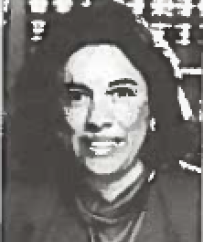By Antonia Hernandez, President and General Counsel, Mexican American Legal Defense and Educational Fund

Antonia Hernandez: “When the Mayor of Los Angeles looks at the challenges that lie ahead, we hope he will recognize what the City needs most: strong visionary leadership, a deliberate plan of action to move Los Angeles forward, and an inclusive administration reflective of the people he represents.”
When the Mayor of Los Angeles looks at the challenges that lie ahead, we hope he will recognize what the City needs most: strong visionary leadership, a deliberate plan of action to move Los Angeles forward, and an inclusive administration reflective of the people he represents.
Every action the Mayor takes can either add to or detract from our efforts to make L.A. the world class city it is striving to become. There are many economic, social and political issues that must be addressed. We muse view these challenges as opportunities to strengthen the infrastructure that will get us closer to our goal. Key to our success in achieving this objective is a holistic strategy that attacks individual problems, such as improving our schools or reducing city hall bureaucracy, while maintaining a broader understanding of how each solution adds to our overall objective of making L.A. a better place to live and work.
The Mayor must impart some of his business acumen to make Downtown L.A. a vibrant central city. Our City is a wonderful conglomeration of cultural and ethnic diversity, of bustling and energetic entrepreneurs, of new and evolving growth industries. By supporting the connection between government functions and cultural facilities the Mayor can promote this synergy and help make Downtown the place to be, reflecting the region's historic settlement patterns and topographic origins. We must design a thoughtful, pedestrian-friendly plan that provides opportunities for all Angelenos to discover and enjoy the uniqueness of this City.
The Mayor must bring together the public and private sectors to work collaboratively on our very diverse needs. For example, the business community has long lamented their inability to find well-educated individuals for many positions that remain unfilled. It must become the responsibility of both the business and educational communities to ensure that our educational system fills the work force needs of L.A.-area businesses. Much talk about mentoring and training program collaboration between schools and businesses must become an everyday part of doing business.
Police issues remain a priority for Angelenos, and besides focusing on getting more cops on the street, we must ensure that the police department effectively serves all of its communities. The Latino community, which comprises 40% of the City's population and continues to grow, has unique needs and concerns that must be recognized and addressed by law enforcement. These include increased hiring, training and promotion of Latino officers at all levels of the department; effective outreach to the Latino community for participation on community police advisory boards; improvement of services provided to the limited-English speaking segment of the Latino population; and attentiveness to the law enforcement needs of Latino neighborhoods. The Mayor must lead in holding the LAPD accountable in meeting the needs of all the City's residents.
Reducing government bureaucracy is essential in order to address the diverse needs, interests and concerns of Los Angeles residents. City government is loo large, inefficient, too costly and provides poor services to the neighborhood communities it is supposed to serve. Government red tape, a multilayered permit procedure, a sluggish approval process, a complicated tax structure, redlining in minority communities limiting access to capital—each of these points away from a Los Angeles that seeks to involve all of its residents in a plan to strengthen the City's economy and the community.
In what affects more than just sports aficionados, the Mayor must work aggressively to bring an NFL football team back to the City of Angels. The City has lost some of its national prominence and a good deal of pride in not being able to cheer for a home team on its own turf. Professional sports teams promote interaction among all who live in and around the City and brings out that special pride of being an Angeleno.
It takes a special breed of city dweller to live in a city as diverse and rapidly evolving as L.A. is. Angelenos deserve an equally special breed of mayor willing to seek input from nontraditional sources, whose appointed administration members reflect the diversity and the growth of the Latino presence in this City, and who is willing to be an agent of change to make Los Angeles the best it can be.
- Log in to post comments



